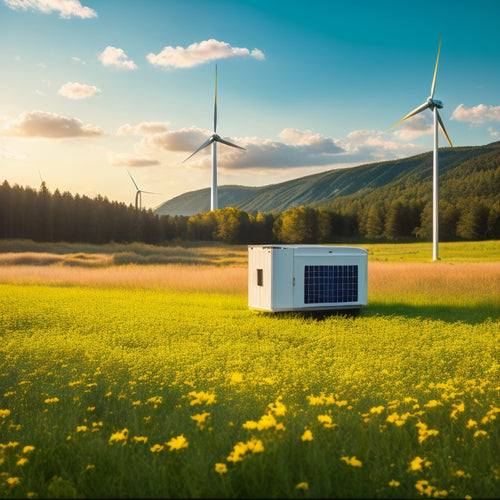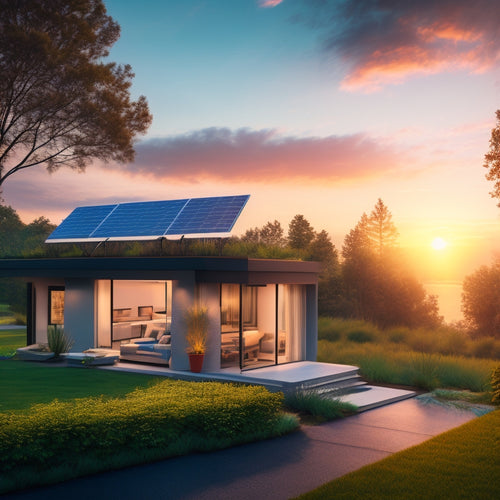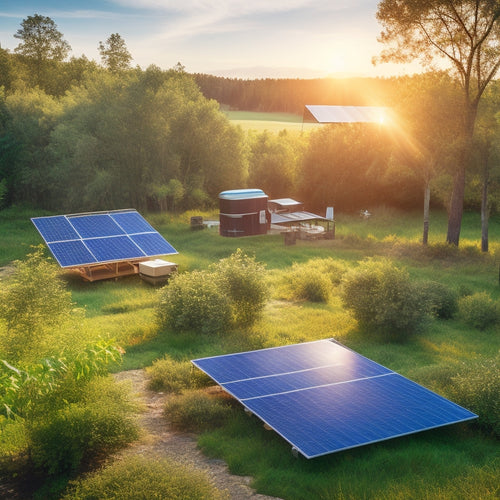
Why Solar Inverters Are Key to Remote Power
Share
When you're relying on solar power to energize remote areas, the inverter's efficiency, reliability, and durability are essential to ensuring a consistent and sustainable energy supply. With peak efficiencies exceeding 98%, advanced thermal management systems, and minimized energy waste, solar inverters maximize energy harvest and reduce environmental impact. You need a reliable energy output, stable power supply, and efficient conversion of DC to AC power. As you explore remote power solutions, you'll find that the right inverter is key to enabling a self-sufficient, off-grid lifestyle – and there's more to discover about how solar inverters can facilitate true grid independence.
Key Takeaways
• Solar inverters provide reliable energy output in areas with limited grid connectivity, making them essential for rural electrification.
• Advanced inverter technology ensures maximum efficiency, minimizing energy waste and reducing environmental impact.
• Durable and efficient inverters withstand harsh environments, guaranteeing reliable operation in remote areas.
• Solar inverters enable grid independence by generating clean energy and reducing carbon footprint, achieving energy autonomy.
• Inverters paired with battery banks ensure a stable power supply, making them key to accessing self-sufficient, off-grid lifestyles.
Advancements in Inverter Efficiency
Recently, manufacturers have been pushing the boundaries of solar inverter efficiency, with some models boasting peak efficiencies exceeding 98%. As you explore the world of solar power, you'll discover that inverter efficiency plays a vital role in maximizing your energy harvest.
The key to maximizing power lies in the inverter's ability to optimize energy conversion. Advanced thermal management systems are now being integrated into modern inverters, guaranteeing that heat is dissipated efficiently, thereby reducing energy losses. This means you can generate more power from the same amount of sunlight, reducing your carbon footprint.
By minimizing energy waste, you'll enjoy a higher return on investment and a reduced environmental impact. When selecting an inverter, look for models with high peak efficiencies and advanced thermal management features. This will ensure you're getting the most out of your solar panels and minimizing energy losses.
With the latest advancements in inverter technology, you can be confident that your remote power system is running at maximum efficiency.
Reliable Power for Remote Areas
As you seek to power remote areas, reliable and consistent energy output becomes paramount, especially in regions where grid connectivity is limited or non-existent. In these areas, rural electrification relies heavily on off-grid solutions, making solar inverters an important component.
You need a system that can provide a stable and consistent flow of energy, guaranteeing that essential services like healthcare, education, and communication remain operational.
In off-grid communities, energy reliability is a top priority. Solar inverters play a significant role in maintaining a stable power supply, allowing these communities to function independently of the grid. By providing a reliable source of energy, you can power critical infrastructure, such as hospitals, schools, and communication networks. This, in turn, enables these communities to thrive, even in the most remote and isolated areas.
When selecting a solar inverter for remote power applications, it's crucial to take into account factors like durability, efficiency, and scalability. You need a system that can withstand harsh environmental conditions, operate efficiently, and adapt to changing energy demands.
Solar Energy Storage Solutions
You'll need a robust energy storage system to guarantee a stable and reliable power supply, especially in remote areas where the grid is unavailable or unstable, and solar energy storage solutions provide the perfect answer. These solutions enable you to store excess energy generated by your solar panels during the day for use during periods of low sunlight or at night.
A key consideration is energy density, which measures the amount of energy stored per unit of mass or volume. Higher energy density translates to smaller, lighter batteries that are easier to transport and install in remote locations.
When selecting a solar energy storage solution, you should also consider battery integration. This involves ensuring seamless communication between your solar inverter, battery management system, and energy storage units. Proper integration enables efficient charging and discharging of batteries, maximizing your energy harvest and reducing the risk of battery degradation.
Inverter Durability in Harsh Environments
Operating in remote areas often means exposing solar inverters to harsh environmental conditions, including extreme temperatures, high humidity, and intense sunlight. As you consider deploying solar inverters in these areas, it's important to prioritize durability and reliability. Extreme temperatures can cause components to degrade, while high humidity can lead to corrosion. To combat these challenges, look for inverters with advanced corrosion resistance features, such as conformal coatings or anodized aluminum enclosures.
| Environmental Factor | Inverter Feature | Benefit |
|---|---|---|
| Extreme Temperatures | Thermal Management System | Prevents overheating and component degradation |
| High Humidity | Conformal Coating | Protects against corrosion and moisture ingress |
| Intense Sunlight | UV-Resistant Materials | Ensures long-term reliability and performance |
| Vibration and Shock | Ruggedized Enclosure | Withstands mechanical stress and vibration |
| Salt Air and Chemicals | Anodized Aluminum Enclosure | Provides superior corrosion resistance |
When selecting an inverter for a remote power application, consider the specific environmental challenges you'll face. By prioritizing durability and corrosion resistance, you can guarantee your solar inverter operates reliably, even in the harshest conditions.
Grid Independence With Solar Inverters
By integrating a solar inverter into your remote power system, you can achieve true grid independence, relying solely on renewable energy to power your critical loads. With a solar inverter, you can harness the energy of the sun to fuel your off-grid lifestyle, freeing yourself from reliance on traditional grid power. This means you can enjoy energy autonomy, generating your own clean energy and reducing your carbon footprint.
A high-quality solar inverter is essential for achieving grid independence, as it efficiently converts DC power from your solar panels into usable AC power for your home or business. By pairing a solar inverter with a battery bank, you can store excess energy generated during the day for use during the night or on cloudy days, ensuring a reliable supply of power.
With a solar inverter, you can live off the grid, enjoying the freedom and security that comes with energy autonomy. Whether you're living in a remote area or simply seeking energy independence, a solar inverter is the key to accessing a self-sufficient, off-grid lifestyle.
Frequently Asked Questions
Can Solar Inverters Be Used for Both AC and DC Power Systems?
You can use solar inverters for both AC and DC power systems, as they facilitate power conversion, allowing for flexible system design and efficient energy distribution in various applications.
How Do I Choose the Right Inverter for My Off-Grid System?
To choose the right inverter for your off-grid system, you'll need to perform a load analysis to determine your energy requirements, then consider system sizing to make sure the inverter can handle your maximum power demand.
Are Solar Inverters Compatible With All Types of Solar Panels?
You'll find that most solar inverters are compatible with various solar panels, but it's important to verify the inverter's voltage tolerance aligns with the panel's voltage output, and consider panel efficiency to optimize energy harvesting.
Can I Use a Single Inverter for Multiple Solar Arrays?
You can use a single inverter for multiple solar arrays, but it depends on the array configuration and inverter capacity. Make sure the inverter can handle the combined power output of all arrays to avoid oversizing or undersizing.
Do Solar Inverters Require Regular Maintenance or Replacement?
You'll need to establish regular maintenance schedules to guarantee peak performance and extend your solar inverter's lifespan, typically ranging from 10 to 15 years, depending on the manufacturer and operating conditions.
Related Posts
-

Sustainable and Eco-Friendly Generators for a Reduced Carbon Footprint
Sustainable and eco-friendly generators are perfect for cutting your carbon footprint and increasing energy efficienc...
-

The Future of Residential Energy Storage
The future of residential energy storage looks promising and cost-effective for you. With lithium-ion battery prices ...
-

Top Off Grid Solar Batteries for Renewable Energy
When seeking top off-grid solar batteries for renewable energy, consider options with advanced battery chemistry, suc...


